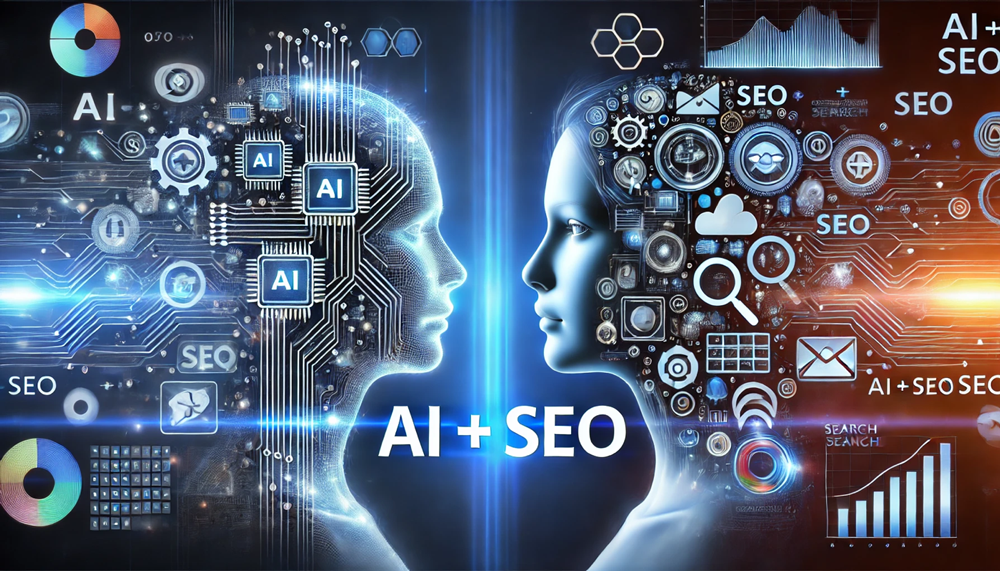Introduction
This piece is the second part of a 5 part SEO Strategy series. Just in case you missed it, check out the “Unconventional SEO Strategies” post.
Search Engine Optimization (SEO) is evolving faster than ever, and Artificial Intelligence (AI) is at the heart of this transformation. From automating keyword research to optimizing content and streamlining technical audits, AI-driven SEO is helping companies improve efficiency, gain deeper insights, and achieve better rankings. Businesses that leverage AI-powered SEO tools can scale their strategies while maintaining precision and adaptability in a constantly changing digital landscape.
This article explores how companies are integrating AI into their SEO workflows, the tools making a difference, and real-world applications that drive measurable results.
1. AI-Powered Keyword Research & Content Optimization
Keyword research has traditionally been a manual and time-consuming process. AI now enhances this by analyzing massive amounts of search data, identifying patterns, and predicting emerging trends with greater accuracy.
How AI is Changing Keyword Research:
- Predictive Analysis: AI identifies future trends before they gain mainstream traction.
- Search Intent Understanding: AI tools analyze user behavior to determine search intent beyond just keywords.
- Automated Clustering: AI groups keywords into topic clusters for better content structuring.
Tools to Use: ✔ Semrush Keyword Magic Tool – Uses AI to suggest high-potential keywords. ✔ SurferSEO – Analyzes SERP trends and suggests keyword-rich optimizations. ✔ Clearscope – Uses AI to recommend the most relevant keywords for content creation.
2. AI for Content Generation & Optimization
AI is transforming content creation by assisting with drafting, enhancing, and personalizing SEO-driven content.
How AI is Enhancing Content Creation:
- Automated Drafting: AI can generate content outlines, topic ideas, and even first drafts.
- Content Scoring: AI tools analyze readability, keyword density, and SEO effectiveness.
- Personalized Content: AI enhances personalization by tailoring content to audience preferences and behaviors.
Real-World Example: E-commerce giants use AI-generated product descriptions to automate large-scale content production while maintaining SEO integrity.
Tools to Use: ✔ ChatGPT & Jasper AI – AI-assisted writing tools for blog posts and product descriptions. ✔ MarketMuse – AI-driven content optimization for SEO ranking improvements. ✔ Frase.io – AI-powered content brief generation and SERP analysis.
3. AI for Technical SEO & Website Audits
Technical SEO is critical for maintaining a search-friendly website, and AI automates many of the processes involved in auditing and optimizing websites.
How AI Helps in Technical SEO:
- Automated Site Audits: AI tools crawl and identify issues such as broken links, slow load times, and indexation problems.
- Schema Markup Implementation: AI assists in structuring data for better search engine understanding.
- Log File Analysis: AI tools analyze server logs to uncover crawl inefficiencies and indexation bottlenecks.
Real-World Example: A SaaS company used AI-driven SEO audits to detect thousands of broken links, fixing them within hours instead of weeks.
Tools to Use: ✔ Google Search Console Insights – AI-enhanced performance analysis. ✔ DeepCrawl – AI-based website crawler for in-depth audits. ✔ Screaming Frog SEO Spider – AI-enhanced crawling and technical issue detection.
4. AI-Driven Link Building & Outreach
Link building remains one of the most challenging aspects of SEO. AI is helping companies streamline this process by automating prospecting, outreach, and relationship management.
How AI Improves Link Building:
- Prospect Discovery: AI identifies authoritative websites and potential link-building opportunities.
- Email Personalization: AI tools craft personalized outreach emails based on recipient behavior.
- Competitor Backlink Analysis: AI reveals competitor backlinks and helps strategize acquisition.
Tools to Use: ✔ Pitchbox – AI-driven outreach and relationship management. ✔ Hunter.io – AI-powered email discovery for link-building campaigns. ✔ Ahrefs – AI-assisted competitor backlink analysis.
5. AI for SERP Feature Optimization
With Google’s increasing reliance on AI-driven search results (e.g., featured snippets, People Also Ask, and Google Discover), companies must adapt their strategies to optimize for SERP features.
How AI Helps Companies Optimize for SERP Features:
- Featured Snippet Optimization: AI predicts snippet opportunities based on structured answers.
- People Also Ask Targeting: AI analyzes commonly asked questions and suggests content improvements.
- Google Discover Readiness: AI tools identify trending topics to optimize for Google Discover.
Tools to Use: ✔ AnswerThePublic – AI-based topic discovery for question-based search queries. ✔ InLinks – AI-driven entity-based SEO for better ranking in knowledge graphs. ✔ Google Natural Language API – AI-powered content structuring for search features.
Final Thoughts
AI is revolutionizing SEO, helping companies automate tedious processes, improve content relevance, and gain deeper insights into search behavior. Businesses that integrate AI-powered tools into their SEO strategies gain a competitive advantage, allowing them to adapt faster and scale efficiently. This is part of the SEO Services that we provide for our cliensts.
💡 Next in This Series: Stay tuned for our next article on how multi-unit businesses optimize Local SEO across multiple locations.
Key Takeaways:
✅ AI enhances keyword research with predictive analysis and search intent modeling.
✅ AI-generated content improves efficiency while maintaining high SEO value.
✅ Technical SEO audits and optimizations are streamlined with AI-driven tools.
✅ AI-driven link-building strategies automate outreach and relationship-building.
✅ SERP feature optimization using AI ensures better rankings in Google’s evolving landscape.
By leveraging AI-powered SEO, businesses can maximize efficiency, improve rankings, and future-proof their digital presence.






